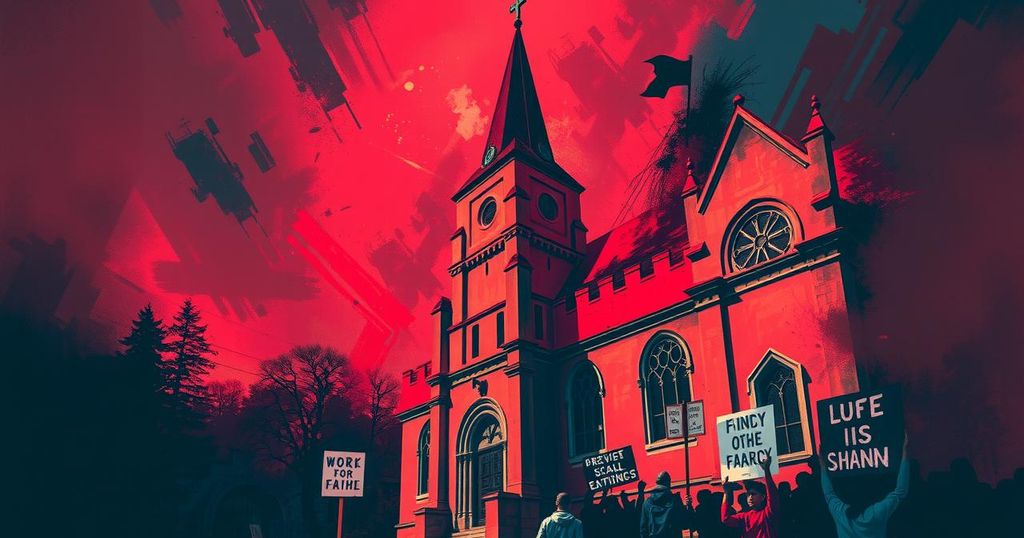Pastor Bakare Critiques Nigerian Leadership in Easter Address
Pastor Tunde Bakare criticized President Bola Tinubu in his Easter address, highlighting issues of poor governance and severe economic hardship in Nigeria. He called for leadership transformation and condemned the “motor park brand of politics” that has plagued the country, calling for more empathy and responsibility in the current administration. Bakare’s messages reflect broader societal challenges and a call for accountability among leaders.
Pastor Tunde Bakare, founder of the Citadel Global Community Church, has voiced significant criticisms regarding the current leadership in Nigeria, specifically addressing President Bola Tinubu during his Easter Sunday broadcast in Lagos. He condemned what he termed a “motor park brand of politics,” which he claims has contributed to legislative misconduct and a decline in constitutional governance. Bakare urged for a leadership transformation, emphasizing that Nigeria is too fragile for the prevailing political style.
In his critique, Mr. Bakare called upon President Tinubu to contemplate the implications of wielding unchecked power and to cease “playing God.” His remarks come in the wake of various controversies in the Nigerian Senate, particularly referring to the situation involving Senator Natasha Akpoti-Uduaghan and Senate President Godswill Akpabio. He expressed disdain over how Senator Onyekachi Nwebonyi treated Oby Ezekwesili, describing the exchange as “street-level vitriol.”
Citing recent altercations, Bakare referred to a session within the Senate’s Ethics Committee where heated exchanges transpired. From the reports, Senator Nwebonyi’s outbursts against Mrs. Ezekwesili culminated in unacceptable behavior towards a fellow legislator. Bakare’s comments highlighted a broader concern about the egregious abuse of political power and the abuse of trust by leaders during critical times, asserting that they lack the humility and character required for effective governance.
The pastor further discussed Nigeria’s concerning economic landscape, criticizing the government’s reforms under President Tinubu, which have resulted in severe hardships. He pointed out staggering increases in food and fuel prices and labeled the economic situation as the worst cost of living crisis in decades. Mr. Bakare referenced alarming statistics indicating an escalation in poverty levels, stressing the importance of compassionate and responsible governance practices.
In acknowledging certain successes, including an increase in foreign reserves, he urged the government to rethink its economic strategies to alleviate the suffering endured by the Nigerian populace. His comments included a poignant recall of tragedies stemming from economic distress, including incidents of desperation leading to several fatalities during food distribution efforts.
Having previously criticized former President Buhari’s governance, Bakare remains vocal in his disapproval of current administration tactics. His history as a political figure includes significant activism, notably through the Save Nigeria Group. Though some have noted his reticence during the Buhari regime, his current criticisms of President Tinubu suggest ongoing unresolved issues from their past political encounters.
In light of recent electoral controversies, Bakare has publicly claimed he would not recognize Tinubu as president, which adds to a complex relationship marked by longstanding political disagreements. His calls for change reflect a demand for leaders who embody integrity, empathy, and accountability in governance, especially amid Nigeria’s ongoing crises.
In conclusion, Pastor Tunde Bakare’s Easter message encapsulates a critical viewpoint of Nigeria’s leadership dynamics under President Bola Tinubu. He calls for an urgent reassessment of political practices, condemns the current economic framework, and highlights the dire consequences of legislative misconduct. His advocacy for humility and transparency echoes the need for substantive change in governance to address the challenges facing Nigerians today.
Original Source: www.premiumtimesng.com




Post Comment